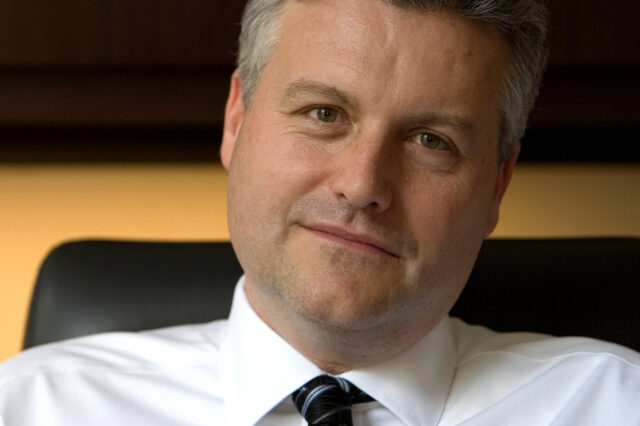Founding chair of UF's department of urology is appointed

Johannes W. Vieweg, M.D., has been named the founding chair of the College of Medicine's new department of urology (Photo by Sarah Kiewel/University of Florida)
Johannes W. Vieweg, M.D., has been named the founding chair of the College of Medicine's new department of urology.
Vieweg, a professor of urology, arrived July 1 from Duke University, where he served as associate professor of urology and immunology and vice chief of research in the division of urology. He is affiliated with the UF Shands Cancer Center.
Much of Vieweg's research has focused on the development and early clinical testing of new immunotherapies and other novel treatments for cancers of the genitourinary tract, including prostate cancer.
Recently he led the first study of a new vaccine that uses the patients' own dendritic cells, a type of white blood cell, to slow prostate cancer growth by priming the immune system to recognize malignant cells and then target them for destruction, without toxic side effects. The vaccine, currently undergoing additional testing, is intended for patients who have not responded to standard treatments.
Vieweg received his medical degree from the University of Munich in Germany and began his residency training in the department of urology at the University of Ulm in Germany. After coming to the United States, he completed three years of postdoctoral training at Memorial Sloan-Kettering Cancer Center in New York before finishing his urology training at Duke.
He said he is eager to infuse renewed energy into urologic research and work toward developing novel clinical services that will provide a comprehensive approach to the treatment of urologic disease.
"UF urology has a long history of providing quality clinical care," he said. "My goal is to broaden and strengthen the existing effort, providing high-quality clinical care in all areas of adult and pediatric urology. In addition, our research program will help to move new therapies into the clinic as quickly as possible."
Robert C. Newman, M.D., the Rudolph Acosta-Rua Jr. professor of urology, led the division since 2001 and oversaw its transition from within the department of surgery to a freestanding department within the College of Medicine in 2004. He remains on the faculty but plans to retire in December.
The College of Medicine Executive Committee's decision to establish a separate department of urology was in line with the approach top programs in urology take elsewhere. The move also was designed to supplement efforts to strengthen the cancer program, as urology is a key player in translational research and clinical oncology, of prime importance in Florida with its substantial number of elderly patients.
Vieweg said the field of urology is currently undergoing a major transformation of its own.
"New basic scientific discoveries and the emergence of new technologies are providing unprecedented opportunities to improve the diagnosis and treatment of patients with urologic disease," Vieweg said. "Those who are able to master and quickly implement these new discoveries into clinical practice will offer the very best in patient care and, thereby, will become the new leaders in urologic health care. The UF department of urology will strive to become a national leader in urology patient care, education and scientific discovery."
A new Good Manufacturing Practices facility is under construction; it will provide engineered cells and small molecules required for vaccine-based clinical trials involving patients with cancer and certain infectious diseases, and produce new stem cell-based therapies. Work also is under way on developing a minimally invasive cancer program that could help treat many patients on an outpatient basis; the approach would capitalize on new robotic technology that is expected to be in place sometime in the first few months of 2007. In addition, faculty physicians are refining tumor-targeting treatments involving heat or cold.
Vieweg cited several unique opportunities for clinical research, including projects involving the development and testing of "targeted therapeutics" as well as improved prediction models for therapeutic success, an effort to better identify which patients will respond to treatment and which won't.
His goals include forging new industry ties with biotechnology companies and others to foster drug development and technological advances. Basic research efforts are focusing on developing new therapeutics to help patients who can't be cured by surgery or radiation therapy alone.
"Surgery can be very good and effective in particular for prostate cancer," Vieweg said, "but almost 50 percent of patients eventually will need additional treatments. We have a strong focus on the development of emerging therapeutics that will be put into clinical trials in an effort to prevent cancer recurrence or the development of metastases."
A cadre of 10 scientists and administrative staff made the move to UF with Vieweg, joining five other existing faculty members. He said he plans to recruit additional faculty, with the goal of achieving "a critical mass of experts in all key areas of urology."
"The clinical practice of urology is the core value here that we embrace," Vieweg said.
"I think medicine is a continuum," he added. "There is a whole spectrum of care from early disease to late-stage disease. We're taking care of the patient as a whole," he said. "We'd like to see them here at UF for life. That's the model we would like to set."
One major emphasis will be on cancer, Vieweg said.
"I like to have a personalized approach," he said. "We are working toward treating patients with less-invasive procedures. There is new technology ahead that will help reduce blood loss and shorten hospitalization. Even in patients we can't cure we have an answer-we are developing therapies to at least slow tumor growth or prevent regrowth of tumors. These are new opportunities that are shaping the future of medicine."
About the author
